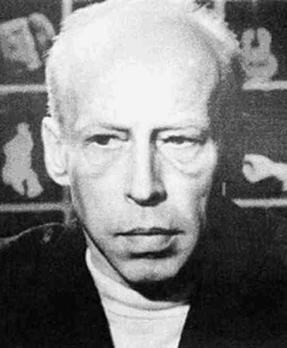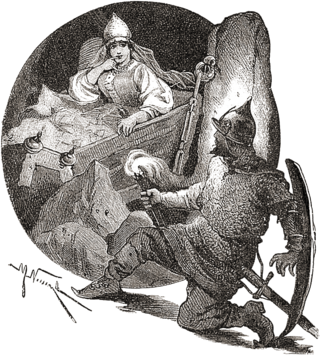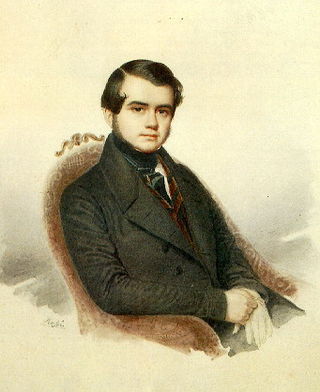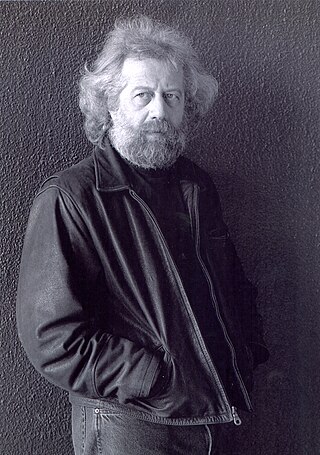
Vladimir Ivanovich Dal was a Russian lexicographer, speaker of many languages, Turkologist, and founding member of the Russian Geographical Society. During his lifetime he compiled and documented the oral history of the region that was later published in Russian and became part of modern folklore.

Fyodor Ivanovich Tyutchev was a Russian poet and diplomat.

The Tale of Tsar Saltan, of His Son the Renowned and Mighty Bogatyr Prince Gvidon Saltanovich and of the Beautiful Swan-Princess is an 1831 fairy tale in verse by Alexander Pushkin.

The House of Golitsyn is the second largest and noblest Princely house in Russia. Among its members were warlords, landlords, Knyaz, knights, diplomats, Prime Ministers, admirals, stewards, State Counsellors and statesmen.

Ippolit Fyodorovich Bogdanovich was a Russian classicist and rococo author of light poetry, best known for his long poem Dushenka (1778).

Vladimir Tendryakov was a Soviet short story writer and novelist.

The Tale of the Dead Princess and the Seven Knights is an 1833 poem by Aleksandr Pushkin telling a fairy tale of Prince Yelisei's search for his love, the Tsarevna (princess), who has been cast out by her stepmother.

Prince Vladimir is a 2006 Russian traditionally-animated feature film. It is loosely based on the story of prince Vladimir the Great, who converted Kievan Rus' to Christianity in the late 10th century. The film tells a romanticized version of the story, adapted for children and filled with fantasy elements.

Ivan Mikhaylovich Sechenov was a Russian psychologist, physiologist, and medical scientist.

Count Vladimir Alexandrovich Sollogub was a minor Russian writer, author of novelettes, essays, plays, and memoirs.

Princess Natalya Petrovna Golitsyna was a Russian noblewoman, lady-in-waiting, socialite, and Dame of the Order of St. Catherine's first degree.

Vladimir Pavlovich Titov, better known under the pseudonym Tit Kosmokratov, was a Russian writer, statesman, diplomat. As a writer he is best known for the novella The Remote House on Vasilyevsky Island, which was influenced by the writings of Aleksandr Pushkin.

Andrey Alexandrovich Krayevsky was a Russian publisher and journalist, best known for his work as an editor-in-chief of Otechestvennye Zapiski (1839–1867), the influential literary journal of which he was also publisher. Another well-known publication Krayevsky founded was the popular newspaper Golos.

Alexandra Osipovna Smirnova (‹See Tfd›Russian: Александра Осиповна Смирнова, née Rosset, known also as Smirnova-Rosset, Russian: Смирнова-Россет; was a Russian Imperial court lady-in-waiting who served first widow Empress Maria Fyodorovna, then, after her death in 1828, Empress Alexandra Fyodorovna. Alexandra Rosset, was an elitist Saint Petersburg salon hostess and a friend of Alexander Pushkin, Vasily Zhukovsky, Pyotr Vyazemsky, Nikolai Gogol and Mikhail Lermontov. She is best remembered for her memoirs, unusually frank, occasionally caustic, and, as it was argued decades later, not necessarily accurate.
The Maiden Tsar is a character in East Slavic folktales. It is best known from Alexander Afanasyev's eight-volume collection Narodnye russkie skazki (1855—1863), folktale "Царь-девица"; variants recorded in Orenburg Governorate and Perm Governorate.
Vladimir Fedorovich Vladimirov was a Red Army Lieutenant during World War II and a Hero of the Soviet Union. He was posthumously awarded the title Hero of the Soviet Union and the Order of Lenin for his actions during the Battle of the Dnieper. Vladimirov was killed in action during December 1943.

Mykola Fedorovych Sumtsov or Nikolai Fyodorovich Sumtsov, sometimes spelled Sumcov, was an ethnographer, folklorist, art historian, literary scholar, educator and museum expert, who flourished in the Russian Empire, Ukrainian People's Republic, and Soviet Ukraine.
Odoyev is an urban-type settlement in the west of Tula Oblast, Russia. It serves as the administrative center of Odoyevsky District. It sits on the left bank of the Upa river, a right tributary of the Oka river, 75 kilometres (47 mi) away from Tula. Prior to 1926, Odoyev had town status.

The House of Odoyev was a branch of the Olgovichi princely family descended from Michael of Chernigov via the sovereign princes of Odoyev and Novosil. Their ancestors were the Upper Oka sovereigns who ruled the tiny Principality of Odoyev until 1494. In the following decade the family was absorbed into the ranks of Muscovite boyars. The Odoyevsky family died out in the mid-19th century. The family was listed in the 5th part of the dvoryanstvo registers of the Moscow and Vladimir regions.

Vladimir Arkadyevich Gandelsman is a Russian poet and translator.


















